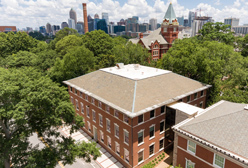Fox Awarded $300,000 NSF Grant
The National Science Foundation has awarded Mary Frank Fox, Advance Professor, School of Public Policy, a 2-year $300,000 grant for the study of “The Transmission Zone between the Producers and Consumers of Knowledge about Women in Science and Engineering.”
Knight Foundation Awards $378,000 for Bogost Project
Ian Bogost, Associate Professor and Director of the Digital Media Graduate Studies Program in the School of Literature, Communication, and Culture has been awarded $378,000 for his project titled "Cartoonist: A System for Generating Editorial Games for Local News Websites."
What Does Georgia Tech Think?
Selected Press for Ivan Allen College of Liberal Arts
|
DiSalvo Discusses GrowBot Technology on CNN
In an October 7 segment on CNN, LCC Digital Media Assistant Professor Carl DiSalvo discussed GrowBots, small robot technology that he is working to apply to local small-scale organic farming. DiSalvo noted that big industrial farms already use robots and high technology. “Realistically, if we got the right support from businesses, these kinds of technologies could be helping small-scale local organic farmers within a matter of years. This is not ten years out, this is not a Mars rover robot. This is something that we could produce pretty quickly if we just get the commitment.”
FutureMedia Keynoter, Google Chief, on False Posts
Google Chief Technology Advocate Technology Advocate plugged Georgia Tech's FutureMedia Fest on CNN and commented on concerns over false information posted on the web: "I'm at the Future Media Conference at Georgia Tech. It's fantastic.. . . .I think the way that really works is that you don't remove things from reality, you add more good things to reality. It's a process of dilution." [LCC Digital Media program faculty were instrumental in planning and hosting FutureMedia Fest]
Brown's Mission at TVA is Energy Efficiency
“My personal mission is going to be how to make energy efficiency a banner investment for TVA,” said School of Public Policy professor and climate policy expert Marilyn Brown in an interview with the Atlanta Business Chronicle. Brown said that serving as a voice on the TVA board for an aggressive approach toward energy efficiency is her top priority. "Nuclear is for eight to 10 years from now,” she said. “Efficiency pays off right away.”
Herbst on Retention and Graduation Rates
Susan Herbst, USG Executive Vice Chancellor and Professor in the School of Public Policy was quoted in Inside Higher Education: "The board [USG Board of Regents] is trying to get in the black box of retention and graduation to try to understand what works and what doesn’t and why,” Herbst said. “Improving these rates is a national problem, and we’ve all written a lot about it, but this is a pretty bold attempt to get directly at it. Throughout this process I’m pleased to see that the presidents really take this personally. They really own this problem and realize they’re accountable for it.”
From Wired magazine: "Electronic Arts' upcoming Medal of Honor was to let players take the role of Taliban soldiers, but under political pressure the company has renamed the warriors to 'Opposing Force.' Over at Gamasutra today, Racing the Beam author Ian Bogost (Georgia Tech) takes Electronic Arts — and the entire game industry — to task over the Taliban-in-Medal of Honor controversy. Bogost’s point isn’t that Electronic Arts should have stood its ground instead of deleting all references to the Taliban in its latest shooter, which it will release on October 12. His beef is with the fact that it was so easy to remove the Taliban in the first place."
|
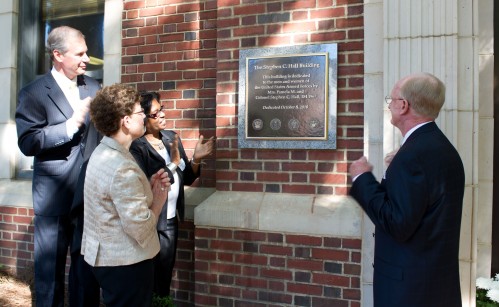
|
Ceremony Dedicates Renovation of the Stephen C. Hall Building for Writing & Communications Program
On a sunny homecoming weekend Friday, October 8, College and Georgia Tech leadership, faculty, and friends gathered to honor Mrs. Pamela M. and Colonel Stephen C. Hall, USAF (Retired) and to dedicate the Stephen C. Hall Building.
The Halls are a steadfast presence at Georgia Tech, and the ceremony celebrated their deep attachment to and support of the Institute, the ROTC, and the Ivan Allen College of Liberal Arts.
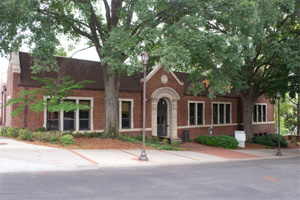 Formerly known as the Navy ROTC building, the structure at 215 Bobby Dodd Way will be renovated to house the School of Literature, Communication, and Culture's (LCC).Writing and Communications Program. Formerly known as the Navy ROTC building, the structure at 215 Bobby Dodd Way will be renovated to house the School of Literature, Communication, and Culture's (LCC).Writing and Communications Program.
The dedication ceremony commenced with the posting of The Colors by Georgia Tech Air Force, Army, and Navy ROTC cadets. Following remarks by President Peterson, Dean Jacqueline Jones Royster expressed appreciation to the Halls for their deep understanding of the College’s liberal arts mission, as well as the broad humanities training the College provides for all Georgia Tech students, and the ever-increasing need for cutting-edge facilities.
“With this renovation, soon to be underway, we breathe easier,” said Royster. “We celebrate the fact that it will take us much farther down the path of accomplishing our most basic Ivan Allen College goals: the creation of a highly charged intellectual community in which students, faculty, and staff come together to foster a culture of communication excellence.”
Mr. Stephen Eiting, Vice President of Operations, L3-Communications Systems-West spoke on the importance of communications skills to rising business managers, and the value of the skills being taught in LCC. Also present for the ceremony were Dr. Kenneth J. Knoespel, who has most recently served as Interim Dean of the College and as Chair of the School of LCC, and Dr. Rebecca Burnett, Director of the Writing & Communications Program, both of whom worked to help bring about the new facility.
.jpg) In a moving speech, Col. Hall explained his commitment to the Ivan Allen College of Liberal Arts and the Writing and Communications Program saying that “the language elevates” and “writing and presenting are not optional.” He also cited his deep admiration for college namesake, Ivan Allen Jr. Hall resided in Atlanta during the 1960s and said that Mayor Allen’s communication abilities were a distinguishing characteristic and a key to his extraordinary leadership during the terrible strife of the civil rights struggle. Col. Hall remembered Development Officer Ski Hilenski, who passed away in 2009, for the inspiration he provided. In a moving speech, Col. Hall explained his commitment to the Ivan Allen College of Liberal Arts and the Writing and Communications Program saying that “the language elevates” and “writing and presenting are not optional.” He also cited his deep admiration for college namesake, Ivan Allen Jr. Hall resided in Atlanta during the 1960s and said that Mayor Allen’s communication abilities were a distinguishing characteristic and a key to his extraordinary leadership during the terrible strife of the civil rights struggle. Col. Hall remembered Development Officer Ski Hilenski, who passed away in 2009, for the inspiration he provided.
“The adventure continues,” said Col. Hall. “An adventure steeped in scholarship, lighted by a legacy, grounded in gratitude, and powered by a promise. That promise being that Pam and I will continue the journey, doing as much as we can, for as long as we can, as Tech and the Ivan Allen College grow into the years ahead.”
 Col. Hall is Director at Large of Depot Operations for L-3 Communication Systems-West, a leading supplier of products and services used in aerospace and defense platforms. A 1967 Georgia Tech graduate with a degree in Management, he served in the Air Force for over two decades. Hall is a member of the Ivan Allen College Development Council, and he and Mrs. Hall have supported many critical activities in the college. They established the Steven C. Hall Endowed Scholarship to help students who are children of active duty military members. They endowed the Bynum Suite in Skiles Building in honor of Col. Hall’s teacher and mentor Dr. James J. Bynum, Jr., a professor who taught in the English Department, now the School of Literature, Communication, and Culture. Col. Hall is Director at Large of Depot Operations for L-3 Communication Systems-West, a leading supplier of products and services used in aerospace and defense platforms. A 1967 Georgia Tech graduate with a degree in Management, he served in the Air Force for over two decades. Hall is a member of the Ivan Allen College Development Council, and he and Mrs. Hall have supported many critical activities in the college. They established the Steven C. Hall Endowed Scholarship to help students who are children of active duty military members. They endowed the Bynum Suite in Skiles Building in honor of Col. Hall’s teacher and mentor Dr. James J. Bynum, Jr., a professor who taught in the English Department, now the School of Literature, Communication, and Culture.
The Halls have sponsored the College’s Founder’s Day Ivan Allen Jr. Legacy Awards which recognize faculty, students, and alumni. Col. Hall has supported the Georgia Tech Alumni Roll Call for nearly 30 years. He is a frequent and popular lecturer on campus speaking to ROTC and history students on World War II strategy and campaigns, and the roles and contributions of women and minorities.
Top Photo: (left to right) Georgia Tech President G. P. "Bud" Peterson, Mrs. Pamela M. Hall, Dean Jacqueline Jones Royster, and Colonel Stephen C. Hall unveiled the building plaque which reads: The Stephen C. Hall Building is dedicated to the men and women of the United States Armed Forces by Mrs. Pamela M. and Colonel Stephen C. Hall, IM 1967. Across the bottom of the plaque are displayed the official seals of the Navy, Air Force, Army, and Marine Corp.
Second Photo: The Stephen C. Hall Building
Third Photo: David Hall (Col. Hall's brother), Mrs. Pamela Hall, Mrs.Christine Hall (Col. Hall's mother), Jacqueline Jones Royster, Col. Stephen Hall, and G. P. "Bud" Peterson in front of the plaque that was unveiled dedicating the Stephen C. Hall building in honor of the Army, Navy, and Air Force ROTC.
Fourth Photo: Rebecca Burnett, Director of the Writing and Communications Program with Col. Hall
|
Airport Study Links Efficiency to Economic Growth, Reveals Nearly 5% Increase in Costs Due to 9/11 Terror Attacks
|
|
Efficient airport operations have a beneficial effect on metropolitan economic development, according to a new study by School of Economics Professor and Chair Patrick McCarthy. McCarthy’s study also provides the first hard data confirming that the 9/11 terror attacks caused significant increases in airport operating costs – nearly 5% on average. Commissioned by the Federal Aviation Administration (FAA), McCarthy’s “Airport Costs, Capacity, and Metropolitan Economic Development: A Translog Panel Data Cost Function Analysis,” establishes a direct linkage between the marginal cost of commercial airport operations and metropolitan economic development. “The notion of airports as an important driver of economic activity is not new,” said McCarthy. “But where past studies have typically examined linkages between various measures of airport output (for example, service employment), this study analyzed the relationship between airport operations and economic activity.” The data revealed that airports that are efficient in handling passengers and thus have higher passenger throughputs correlate to more robust indices for economic development in their metropolitan areas, explained McCarthy. Specifically, the study showed that, all else constant, decreasing an airport’s real marginal operating costs significantly increases employment, the number of establishments, and real gross metropolitan and state product. A by-product of McCarthy’s analysis was findings that reveal how much the 9/11 attacks drove up commercial airport operating costs. Based upon an analysis of 35 large and medium hub airports over a 12-year period, airport operating costs in metropolitan areas that have one commercial airport have increased 4.6% since 9/11. Atlanta’s Hartsfield-Jackson Airport was an exception, showing a 24.1% increase. That seemingly outsized surge in costs reflects the fact that Atlanta serves a yearly average of 35 million passengers, nearly four times the average for large U.S. metropolitan areas in the sample. The large number of passengers served accounts for the post-9/11 cost increase that is more than 5 times that of the sample average. “The cost of post 9/11 airport security has been a significant factor in airport cost structure,” said McCarthy. The study findings add important knowledge about airports, their costs, and their productivity at a time when infrastructure improvements have been brought to the forefront by the Obama administration. The study notes that, “Similar to any large enterprise, airports manage a significant amount of resources in providing the necessary infrastructure for air travel and air freight. By allocating its resources more efficiently, an airport reduces time and out-of-pocket costs of individuals and businesses and provides an environment for the metropolitan area and region to strengthen its economic base and develop faster.” Further, in focusing upon metropolitan growth and development, this study adds to the developing literature on the role of airports in metropolitan growth and will have implications for regional, metropolitan, and local policy makers. With funding from Georgia Tech’s University Transportation Center and the Georgia Department Of Transportation, McCarthy is continuing to analyze the effect of airport operations on metropolitan growth and development. |
Norton Asks Presidential Commission to Consider Impacts of Synthetic Biology on Biodiversity
|
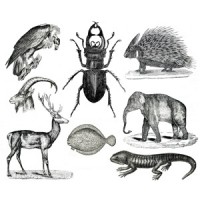
Researchers in the emerging field of synthetic biology are going beyond the recombination of genetic material, such as hybrid corn or genetically altered vegetables, to create new material and life forms with no precedents in the natural world. Is that an important difference?
Further, might such synthetic life forms damage efforts to protect Earth’s naturally occurring biodiversity?
“Such questions should be fundamental to formulation of biodiversity policy and consideration of the future of biodiversity,” says Bryan G. Norton, Distinguished Professor of Philosophy, Science, and Technology in the School of Public Policy. “Yet debate on the topic has been muted, at best.”
A biodiversity advocate, Norton presented his concerns during the second meeting of the Presidential Commission for the Study of Bioethical Issues September 13-14 in Philadelphia.
Underlying the specifics Norton raised to the commission [see full remarks], is his concern that, “As the emergent field develops a conceptual framework appropriate to its internal needs, it may lose its connection to biology and ecology, and practitioners may lack the conceptual links that encourage them to recognize the importance of natural habitats for wild species.”
“Synthetic life forms are not, and cannot be, a substitute for a living, breathing, evolving species. To the extent that life forms are reduced to collections of ‘biobricks’ without a clear articulation of the importance of natural diversity for both instrumental and more moral reasons, synthetic biology may unwittingly become the enemy of biodiversity protection in situ.”
Norton did not predict answers to the discussion points he posed to the commission; he posed possible scenarios and evermore profound questions for consideration such as will society’s current values about nature and wild species somehow be devalued by the advance of synthetic biology?
“It is not implausible to claim that a culture that sees life as collections of biobricks might lose its passion for wild nature and forget its moral value beyond its exchange value,” said Norton.
He advocated an active effort to encourage dialogue between synthetic biologists and conservation biologists. “Our culture needs to have an enlightening discourse, in conjunction with the examination of policies to guide synthetic biology, about the diversity of meanings of ‘diversity’ that currently stifle any common discourse among practitioners of conservation biology, environmental policy, and synthetic biology.”
Norton’s discussion of concerns about the divorce of synthetic biology from the broader discourse of biology was complemented in the ethics session by a discussion, presented by Jonathan Moreno, the David and Lyn Silfen University Professor of Ethics and Professor of Medical Ethics and of History and Sociology of Science at Penn, of the risks that synthetically created life forms might escape from laboratories.
It was agreed by Commission members that both of these concerns must be an important part of the future discussion of policy regarding synthetic biology. The Commission will, ultimately, advise President Obama relative to bioethical issues and technologies with a goal of “identifying and promoting policies and practices that ensure scientific research, healthcare delivery, and technological innovation are conducted in an ethically responsible manner.” It continues to gather input from academic and other experts. The next meeting occurs November 16-17 in Atlanta.
Archived video of Norton’s presentation can be seen at: www.Bioethics.gov. Go to Meetings, Past Meetings, Aug. 29-30, 2010, choose “Archived Video” and go to Session 5. |
LCC’s Crawford is Recipient of 2010 BOR Teaching Excellence Award
|
|
Thomas (Hugh) Crawford, Associate Professor, School of Literature, Communication, and Culture, is one of the three University System of Georgia (USG) faculty members and one academic department chosen as this year’s recipients of the Board of Regents’ Award for Excellence in Teaching. Crawford’s nomination cited him as “being gifted in the way he designs his courses to adapt to the students at Georgia Tech. When he and his students built a replica of Henry Thoreau’s house on campus, he had many students volunteering to work on the house who weren’t even enrolled in his course. He has had a lifelong impact on his students, who have given a legacy title of their own to his courses: “a Crawford course.” The review committee noted that he is a role model for literature and writing faculty everywhere. The Teaching Excellence Awards honor exemplary teaching that significantly improves student success. Recipients are selected from nominations submitted by the presidents of USG institutions. Each of the award winners receives $5,000 and a certificate of achievement. Crawford and fellow honorees will be formally announced by BOR next spring and will be recognized at the USG Foundation’s Seventh Annual Excellence Awards Celebration in March 2011. |
New AFROTC Commander Shawn Bevans Notes Impact of Technology Innovations
|
|
Only twenty years ago, when Lieutenant Colonel Shawn Bevans was starting his aviation career, he used a sextant to navigate aircraft. Today’s military aircraft employ the most advanced GPS integrated flight management systems. Bevans commented on the amazing rapid advance of technology and its impact on military operations. “This impact has been transformational in both aviation and the execution of military command and control,” said Bevans. “Today, military commanders leverage information systems to accelerate the decision cycle time to achieve an edge in operations. The concept of condensing the military decision cycle to maintain operational and tactical initiative was best defined by USAF fighter pilot and military theorist Col. John Boyd, an alumnus of Georgia Tech." Bevans assumed command of the Air Force Reserve Officer’s Training Corps (AFROTC), Detachment 165, at Georgia Tech in August for the standard three year term of duty. He is also Professor of Aerospace Studies. “The AFROTC cadets at Georgia Tech have the advantage of learning at one of the best schools in the nation,” said Bevans. “The new Lieutenants we commission from Georgia Tech will advance US Air Force capabilities even further in air, space, and cyber-space. I feel very fortunate to be part of a program that is so valuable to our nation.” Born into an Air Force family, Bevans earned a B.S. in Military History from the United States Air Force Academy, Colorado Springs, Colorado. He was commissioned there in May 1989 and graduated from Undergraduate Pilot Training in September 1990. Bevans earned a Master’s in Aeronautical Science from the Embry-Riddle Aeronautical University, Daytona Beach, Florida. He has also trained via distance learning at the Command and Staff College and the Air War College. A Command Pilot, Bevans has logged more than 3400 flight hours, 120 combat flight hours and 360 combat flight support hours. He has flown the KC-135, the T-38, the T-37, the C-17 and T-1 aircraft. He flew in several major contingencies from Operation DESERT STORM in Iraq to Operation ENDURING FREEDOM in Afghanistan. Bevans was awarded the Bronze Star with one oak leaf cluster, the Defense Meritorious Service Medal, the Air Force Meritorious Service Medal one oak leaf cluster, and the Air Medal Aerial Achievement Medal with one oak leaf cluster. Bevans has also served in various Air Operations Centers and Special Operation Joint Task Forces in support of the Global War on Terrorism. Just prior to his assignment at Georgia Tech, Bevans served as Commander Mobility Operations School Detachment One, Hurlburt Field, Florida. “The Ivan Allen College, the engineering programs, and the quality of the students here have impressed me greatly,” said Bevans. “My goal is to continue the tradition of the U.S. AFROTC at Georgia Tech of training officers of the highest possible caliber. I want to develop the best officers in the USAF - officers who are motivated, imaginative, and ready to lead.” |
Visiting HTS Scholar Examines History of Urban Travel Demand Modeling
|
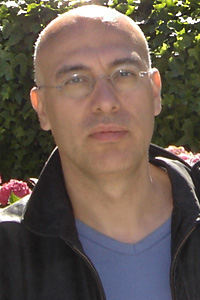
Engineers have been using mathematical models to forecast urban travel for nearly 50 years. Despite their impact on urban form and the ways cities work, the history of these engineering tools has been accorded very little interest until now.
Konstantinos Chatzis, Visiting Professor in Ivan Allen College’s School of History, Technology, and Society (HTS) through July 2011, is tackling the history of urban travel forecasting (UTF). The first analysis of its type, his work will focus on France and the United States from the 1950s to the present.
“UTF tools remain of key importance in the transportation profession and in urban transport policies,” said Chatzis. “To size and assess new urban transport infrastructures, such as urban highways or subways, or to make optimal use of existing capacity (thanks to policy instruments such as tolls and real time information systems), one needs to forecast urban traffic.”
Chatzis’ analysis will be carried out from a comparative and transnational perspective by focusing on the circulation and transfer of the modelling practices, and will treat both the “content” of the modelling or mathematical formulas and the entire “production-use” chain of these formulas: actors involved, household travel surveys, computers, and software required.
“HTS, with the pluridisciplinary profile of its faculty, is the right place for my research, and the impressive range of documents available within the Georgia Tech Library and its counterpart at Emory University make them just stunning sites to work,” said Chatzis. He anticipates completing the field work for the American part of his research project and producing a sketch of the book he plans on the history of Urban Travel Forecasting in France and the United States.
A native of Greece, Chatzis is a research scholar at the Ecole des Ponts ParisTech, an engineering school. He graduated from the National Technical University of Athens, a five-year engineering institution, and earned a PhD in social sciences from the Ecole des Ponts ParisTech in France. He is a Senior Researcher at
INRETS (National Institute for Transport and Safety Research-FRANCE), and a tenured full-time researcher at the LATTS (Laboratory Technology, Territories and Societies), a French interdisciplinary research center located at Ecole des Ponts.
Chatzis is Associate Editor for the journal Engineering Studies and member of the Editorial Board of another journal, Almagest. His main research interests are: the engineering profession, engineering education, and engineering sciences in France and Greece in the 19th and 20th centuries; the development of large urban socio-technical systems centuries, such as water supply networks, storm water drain systems and transport networks (19th-20th centuries); the rationalization process in French industry in the 20th century; and transnational and comparative history of engineers and engineering. |
In Brief
Women, Science, and Technology Lecture to Honor Former Dean Sue Rosser Planned
Sue Rosser, Dean of the Ivan Allen College from 1999-2009 will be honored through a special event on campus January 12, 2011. Hosted by Dean Jacqueline Jones Royster and Don P. Giddens, Dean of the College of Engineering, the event will highlight Rosser’s research and leadership in attracting and retaining women in science, technology, and engineering. Following a 3:30pm reception, there will be a lecture at 4:00pm in the Clary Theater: "Gendered Innovations in Science and Engineering," by Londa Schiebinger, the John L. Hinds Professor of Science and Director of the Gendered Innovations in Science, Medicine, and Engineering Project in the Department of History at Stanford University. Rosser assumed the position of Provost at San Francisco State in August, 2009. She is Professor Emerita in the Ivan Allen College School of Public Policy.
Goodman Appointed to Computer Science and Telecommunications Board
Seymour Goodman, Professor in the Sam Nunn School of International Affairs has been appointed to the Computer Science and Telecommunications Board (CSTB) of the National Research Council of the National Academies. The CSTB provides independent advice to the federal government on technical and public policy issues relating to computing and communications. Goodman will serve on the board three years alongside leaders in the information technology and complementary fields from industry and academia including Sun Microsystems, HP, IBM Research, Google, Inc., Cornell University, Carnegie Mellon University, and the Massachusetts Institute of Technology.
Georgia Tech Researchers Highlight Implications of Nanotechnology in New Encyclopedia of Nanoscience and Society
Georgia Tech researchers are prominently represented in the newly released Encyclopedia of Nanoscience and Society, published by SAGE Publications, Inc. The Encyclopedia is a landmark international collaboration which reviews and reflects upon a wide range of topics related to the implications of nanotechnology – gauging its promises and risks, assessing the impacts of policy decisions, and communicating the meaning of nanoscience research.
Georgia Tech faculty contributing articles are Susan E. Cozzens, Alan Porter, Juan Rogers, and Philip Shapira, all from the School of Public Policy, and Jan Youtie of the Enterprise Innovation Institute. Three public policy doctoral students, Stephen Carley, Vrishali Subramanian, and Li Tang also contributed articles. All of these researchers are associated with the Georgia Tech component of the Center for Nanotechnology in Society at Arizona State University (CNS-ASU), which is funded by the U.S. National Science Foundation to undertake research, education, and outreach on the societal aspects of nanotechnology. Their articles consider the following topics in relationship to nanotechnology development: Active Nanostructures (P. Shapira, V. Subramanian, & J. Youtie); China (L. Tang, J. Wang, & P. Shapira), Data Mining (L. Tang & A. Porter); Equity (S.E. Cozzens & J.M. Wetmore); Nanodistricts (P. Shapira, J. Youtie, & S. Carley); Research Patterns (A. Porter & I. Rafols); Research and Innovation Assessment (J. Rogers); and the United States (P. Shapira & J. Youtie). Read more
Fabry Awarded APSA Campus Teaching Award
Mikilus Fabry, Assistant Professor in the Sam Nunn School of International Affairs, has been awarded the APSA Campus Teaching Award. The certificate of honor is given jointly by the American Political Science Association (APSA) and Pi Sigma Alpha, the national political science honor society. Fabry was chosen based upon his receiving simultaneous “Thank a Teacher Certificates for Excellence in Teaching” (CETL) for two courses he taught in Spring 2010: a lecture course on human rights and a joint graduate-undergraduate seminar on international law. The CETL awards encourage “students to recognize teachers who are making a difference in their education.”
Royster and Stulberg Will be Featured at November 13 Home Game
Ivan Allen College will be front and center at the Miami game on November 13 as part of two promotions underway by Georgia Tech Athletics during this year’s football season.
Dean Jacqueline J. Royster and her husband, Patrick, will be “Guest Coaches” for the game and will be introduced on the field at half time.
Sam Nunn School of International Affairs Associate Professor Adam Stulberg will also be featured during the game. Stulburg is one of six Georgia Tech faculty who are being highlighted during home games as a Subaru “Professor of the Excellence.” Subaru will make a $1,000 grant to the Nunn School in Stulberg’s name. Read more
Association of University Interior Designers (AUID) Will Tour Swann and Old CE Buildings
The Swann and Old CE buildings will be toured October 19 by members of the Association of University Interior Designers (AUID), who will be in Atlanta for their annual conference. The buildings are of significance because of renovations that blend the high tech functionality needed for classroom space while preserving the classical features of these historic campus buildings. Located at 613 Cherry Street, Swann was built in 1900 and renovated in 2005 to house the School of Modern Languages. The Old Civil Engineering Building, at 221 Bobby Dodd Way, was built in 1939 and renovated in 2009 as home to the Schools of Economics and History, Technology, and Society. The Old CE renovation is also of note for its Leadership in Energy and Environmental Design (LEED) certification by the U.S. Green Building Council. The architects for both renovations were Surber Barber Choate & Hertlein. Read more
Top photo is Swann Building, bottom photo is Old CE
|
Undergraduate Student Profile - Elle Creel
|
|
Elle Creel is a Public Policy (PUBP) major, Honors Program student, and President's Scholar. What do you enjoy most about the Public Policy program at Tech? I love how Public Policy is a blend of theoretical and practical knowledge. The core classes explore the ethics and theory behind policy decisions, as well as the facts, the statistics, and the precedents. Both theoretical and empirical facets must be taken into account for a successful policy decision. This dual way of thinking is applicable far beyond policy-making. It is a way to perceive and think about the world. What is it like being an Honors Program student at Tech? The Honors Program has given me the opportunity and the inspiration to take classes I would not have usually taken. The program seeks out the best professors, gives them the opportunity to construct unique courses, and keeps classes small. This combination results in truly incredible classes. The most unique honors course that I have taken at Tech was entitled: Race, Space, and Architecture. We met in a small section and examined the history, politics, and current struggles of English Avenue, a neighborhood adjacent to the west side of Georgia Tech. The neighborhood is facing serious challenges but is also developing significant strategies for change. Our class developed project proposals that could be implemented in English Avenue. I worked on developing a plan for a community garden in the neighborhood. My group studied gardens in many other Atlanta neighborhoods and developed a plan for acquiring property, funding, and support for the project. This project gave me an understanding of the many challenges and potential rewards in community development projects. This class experience led me not only to an internship in the Office of Community Relations and a 300-page research report about the history of English Avenue, but gave me a deeper understanding of the past and current plights of struggling Atlanta neighborhoods and appreciation on how challenging it is to implement an effective policy in neighborhood development. How are you involved in the Georgia Tech community? Through Student Government Association (SGA) and my other involvements, I have learned how truly rewarding it is to be engaged in the Georgia Tech community. This past year I served as a Sophomore Representative for SGA. One of the primary responsibilities of representatives is allocating the Student Activities Fee, which comes to between 4 and 5 million dollars annually. Seeing a small-scale political process at work revealed so many parallels to the topics in my Public Policy courses from agenda setting to opinion formation to the use of precedents. I am also involved in Alpha Chi Omega Sorority, GT 1000 TL, and AIESEC, which is an organization that provides an integrated development experience comprised of leadership opportunities, international internships, and participation in a global learning environment. |
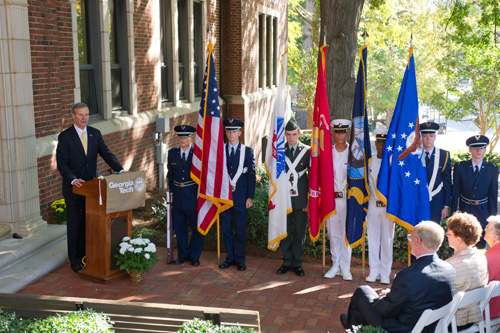
|
This Month's Banner Photo
President G. P. "Bud" Peterson at the podium for the presentation of The Colors by Georgia Tech Air Force, Army, and Navy ROTC cadets during the October 8 ceremony dedicating the renovation of the Stephen C. Hall Building at 215 Bobby Dodd Way. Col. Hall and Mrs. Pamela Hall are seated in the foreground. See first feature story.
|
|

